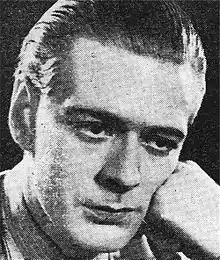Raymond Raikes
Raymond Montgomery Raikes (13 September 1910 – 2 October 1998) was a British theatre producer, director and broadcaster. He was particularly known for his productions of classic dramas for BBC Radio's "World Theatre" and "National Theatre of the Air" series, which pioneered the use of stereophonic sound in radio drama broadcasts. He received two Prix Italia awards in 1965 for his stereophonic productions of The Foundling by A. R. Gurney and The Anger of Achilles by Robert Graves.
Raymond Raikes | |
|---|---|
 | |
| Born | Raymond Montgomery Raikes 13 September 1910 Putney London |
| Died | 2 October 1998 (aged 88) |
| Nationality | English |
| Occupation | Theatre and radio producer and director |
| Known for | BBC Radio dramas |
Life and career
A descendant of the philanthropist Robert Raikes, Raymond Raikes was born in Putney London and educated at Lambrook, Uppingham School and Exeter College, Oxford. After leaving Oxford University, he began his career as a film and stage actor, appearing with the Birmingham Rep and the Shakespeare Memorial Theatre as well as in the West End play While Parents Sleep. His film appearances included The Poisoned Diamond (1931), directed by W.P. Kellino, The Water Gipsies (1932), directed by Maurice Elvey and It's a Bet (1935), directed by Alexander Esway. During World War II, he worked as an announcer for the BBC Forces Programme for two years and then joined the Royal Signal Corps, with whom he served in North Africa, Italy, and London.[1][2]
After the war, he joined the BBC drama department, initially working on the production of the soap opera The Robinson Family and then producing and directing the Dick Barton - Special Agent series which regularly obtained 20,000,000 listeners daily. He went on to become a producer and director for the BBC Third Programme, where his output included 17 Shakespeare plays, the Oresteia trilogy by Aeschylus; The Wasps and Lysistrata by Aristophanes; and The Bacchae, Medea and Hippolytus by Euripides. He also introduced British radio audiences to less frequently performed Elizabethan and Jacobean dramas, Restoration comedies, and works by 20th century authors such as Robert Graves and Jean Anouilh. For many of the plays he directed, he would adapt the archaic English for modern audiences and he also adapted existing English translations of foreign works.[1] Many of the productions had incidental music written by the composer Stephen Dodgson, with whom he had a long and genial collaboration.[3] At the 1965 Prix Italia, Raikes won the RAI Prize for literary or dramatic programmes with The Anger of Achilles by Robert Graves and the Prix Italia for stereophonic musical and dramatic programmes with A. R. Gurney's The Foundling (music by Humphrey Searle).[4]
His cousin was Lieutenant Commander Dick Raikes DSO of The Cockleshell Heroes fame.
Raikes' last production for the BBC was his own translation of Euripides' Iphigeneia in Aulis in 1975.[5] Following his retirement, he studied Egyptian hieroglyphics and Russian as hobbies. He had a large personal library and for many years also served as chairman on the library committee of the Garrick Club. Raikes died in his sleep at his home in Bromley, Kent at the age of 88. He was survived by his wife, Wendy (née Howard of the Howard family) whom he had married in 1939. The couple had one daughter.[1] Raikes' papers, including scripts, production papers and correspondence, were acquired by the BBC Written Archives Centre in 2003.[6] He was buried at West Norwood Cemetery where his headstone which he shares with his father and grandfather features closing theatrical curtains.
References
- Tydeman, John (8 October 1998). "Obituary: Raymond Raikes". The Independent. Retrieved 29 April 2013.
- British Film Institute. Raymond Raikes:Filmography
- Foreman, Lewis (1 May 2013). "Stephen Dodgson: Composer hailed for his guitar works". The Independent. Retrieved 25 May 2013.
- RAI (2012). Prix Italia: Winners 1949-1998. Retrieved 29 April 2013.
- British Broadcasting Corporation (1977). BBC Handbook, p. 26
- The National Archives (United Kingdom). BBC Written Archives Centre: 2003 Accessions. Retrieved 29 April 2013.
Further reading
- Lentz, Harris M. (1998). "Raikes, Raymond", Obituaries in the Performing Arts, p. 186. McFarland & Company
External links
- "Raymond Raikes and Stereo Sound", summary by Nigel Deacon/The Diversity Website of an article by Gillian Strickland, originally published in the Radio Times, September 1973
- Raymond Raikes at IMDb